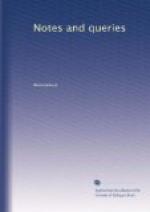Poggio speaks of Valori as having been one of the
principal members of the Council of Florence.
The Abbe thence justly concludes, that the ambassador
could not have been a Jew; and it is extraordinary
that Daru, after such a conclusive argument, should
have admitted the term Jew into his text.
But the truth is, that this writer (like many others
of great reputation) preferred blindly following the
text of Sanuto, as printed by Muratori[2], to the
trouble of consulting any early manuscripts. It
happens, however, that in a manuscript copy of these
Orations of Mocenigo, written certainly earlier than
the period of Sanuto, and preserved in the British
Museum, MS. Add. 12, 121., the true reading
of the passage may be found thus:—“Fo
mandato Bartolomio Valori, homo richo, el qual
viveva de cambij.” By later transcribers
the epithet richo, so properly here bestowed
on the Florentine noble, was changed into iudio
(giudeo), and having been transferred in that
shape into Sanuto, has formed the groundwork of a
serious error, which has now existed for more than
three centuries and a half.
FREDERICK MADDEN.
British Museum, Nov. 7. 1849
[2] In the Rerum Italicarum Scriptores, tom. xxii. col. 947., the passage stands thus: “Fu mandato Bartolomeo Valori, hom giudeo, el qual vivea di cambi.” Two late copies of Sanuto, formerly in the Guildford collection, and now in the British Museum, MS. Add. 8575, 8576, read, “Bartoli Valori, hom iudio.”
* * * * *
LETTERS OF LORD NELSON’S BROTHER IMMEDIATELY AFTER THE BATTLE OF TRAFALGAR.
[The following letters will be best illustrated by a few words derived from the valuable life of our great naval hero lately published by Mr. Pettigrew. Besides his last will, properly so called, which had been some time executed, Lord Nelson wrote and signed another paper of testamentary character immediately before he commenced the battle of Trafalgar. It contained an enumeration of certain public services performed by Lady Hamilton, and a request that she might be provided for by the country. “Could I have rewarded those services,” Lord Nelson says, “I would not now call upon my country; but as that has not been in my power, I leave Emma Hamilton, therefore, a legacy to my king and country, that will give her ample provision to maintain her rank in life.” He also recommended to the beneficence of his country his adopted daughter. “My relations,” he concludes, “it is needless to mention; they will of course be amply provided for.”
This paper was delivered over to Lord Nelson’s brother, together with his will. “Earl Nelson, with his wife and family, were then with Lady Hamilton, and had indeed been living with her many months. To their son Horatio, afterwards Viscount Trafalgar, she was as attentive




